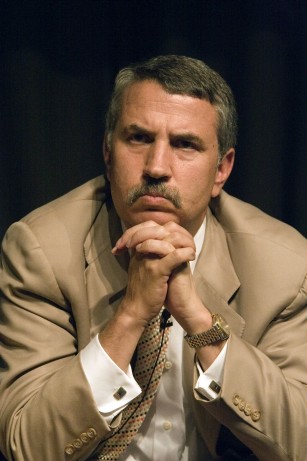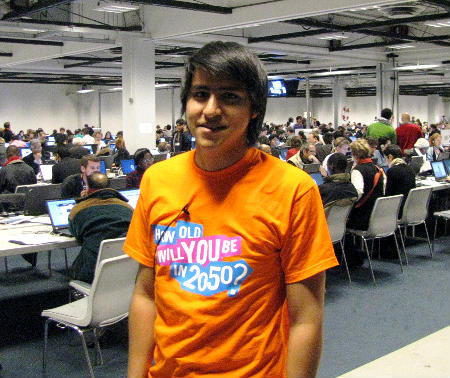 Thomas FriedmanHours before the outcome of the Copenhagen conference was revealed, I sat down with New York Times Columnist Thomas Friedman to discuss the implications of the historic summit. No matter what happens in Copenhagen, said Friedman, what matters most is what happens at home: Where the U.S. goes, so goes the world. But we can’t lead the world without charting a path for ourselves. [UPDATE: See video highlights from the interview at the bottom of the page.]
Thomas FriedmanHours before the outcome of the Copenhagen conference was revealed, I sat down with New York Times Columnist Thomas Friedman to discuss the implications of the historic summit. No matter what happens in Copenhagen, said Friedman, what matters most is what happens at home: Where the U.S. goes, so goes the world. But we can’t lead the world without charting a path for ourselves. [UPDATE: See video highlights from the interview at the bottom of the page.]
Q. Did you have high expectations for Cop15?
A. I really question this whole process — and to some extent, its premise. Let me put it this way: Anything 192 countries could agree on would not be serious. Because it would be such a lowest common denominator that it’s not serious. At the end of the day, what I believe matters more than anything is what America does. Because if we lead it, more people will emulate us by just wanting to emulate us than will do the right thing by compulsion of a global treaty. What I care about is what 60 senators in the U.S. Senate will agree on and I want that to be a serious cap-and-trade or a serious carbon tax. If the U.S. leads–we still got a lot of juice–people will follow.
Q. Sen. Kerry said that success in Copenhagen would help the Senate move cap-and-trade legislation this spring, and that failure in Copenhagen would kill it.
A. Honestly, I think success here might be just as likely to kill the prospects of legislation in the Senate as failure. The issue of climate change rubs so many Americans the wrong way. You have to start the conversation with the American people on energy, not climate. The conversation has to be about making American more innovative, more energy secure, more economically competitive, a world leader. If you start on climate you’re dead–you can’t move people on this issue, first of all because they don’t feel it in their lives. People don’t want to hear they’re going to die – they’re inspired by self interest and by hope.
I learned one thing covering the Arab-Israeli conflict: the way you get big change is by getting the big players to do the right things for the wrong reasons. If you wait for everyone to do the right thing for the right reason, you’re going to be waiting a long, long time.
Q. So any outcome in Copenhagen would be a barrier to progress in America, simply because of its focus on climate?
A. How do you think it would go over if you go back home to Nashville TN, and say, “Hi I’m Amanda. I just was at Copenhagen, and we all agreed that we’re going to give $100 billion dollars a year to developing countries to do clean tech. How do ya’ll feel about that?” After they run your ass out of town, I don’t think you’re going to get real far. Look at the American media: They’re all full of “Hillary: 100 dollar billion giveaway!” You really think a majority of Americans want to pitch in for transfers of money to the third world? I just don’t think it’s going to happen. We can’t even get it through our Congress to have our own health care bill through so all Americans can have proper health care. We’re going to give money away so people could put up wind farms in sub Saharan Africa? That’s not going to happen. What planet does that happen on?
Q. So the challenge is convincing Americans that we need to put a price on carbon in order to drive economic opportunity in clean tech.
A. Here’s what I’d say to Americans: You don’t want a tax on carbon? You don’t think you’re paying a tax now when your oil price is determined by the world’s biggest cartel called OPEC? You don’t call that a tax? It’s a tax that goes to the treasuries of oil-producing nations — the Russian treasury, the Venezuelan treasury, and the Iranian treasury. So I say yeah, I want to have a carbon tax and I want that to trigger the clean tech revolution in my country and the tax will go to the American treasury. Me, I kind of like my tax dollars to go to my country — to pay for American schools, research, universities, roads, hospitals and innovation.
Q. What should Obama have said to the world in Copenhagen?
A. I would have had him give a very short speech. He should look Wen Jiabao, the Chinese premier, in the eye and say: “Mr. Wen, I just have one thing to say to you: We are going all in on clean tech. I’m going home and I’m going to get through the U.S. Senate a cap-and-trade bill, a carbon price, a carbon tax, whatever it is that will trigger massive scale investment in clean tech in America. And please take this message back to China: We will bury you. We are going to bury you in clean tech.” And then Wen would get up and walk out of the room and he’d go back to China and say: “We are going to bury you, pal. Okay?” And then we have the world’s two biggest powers having an arms race on clean tech.
Really, if I were Obama I’d be working day and night to get through the U.S. Senate a cap-and-trade bill or a carbon price on the assumption that once we do it, everything falls into place. And then you come back to the world and say: “We’ve done it. We’re gonna bury you in solar panels. We’re going to bury you in wind farms. We’re going to bury you in cellulosic ethanol.”
Q. So solving climate change is all about creating economies of scale for clean tech?
A. There’s only one thing that’s as big as Mother Nature and that’s Father Greed. It is the market. And the way you leverage the market is to get the world’s biggest, capitalist country to take the lead in the clean tech industry. So that’s where I come from. When you’ve got Father Greed behind you — that’s self sustaining. You can sell that in Oklahoma City. An American energy policy that only is supported by blue states, that’s not going anywhere. That’s not going to have scale.
Q. What are the stakes for China in solving the climate crisis?
A. For China, GDP is not just a question of growth and rising standard of living. It’s a question of political stability. You have an authoritarian regime that has made a bargain with its people: You get to get rich and we get to stay in power. If the people don’t get to get rich, then that raises implications about their ability to stay in power, and therefore anything that inhibits or slows down the Chinese economy really has political implications. So when the United States or the world community says, “We want you to limit your CO2 emissions,” China has to ask very seriously: “What are the implications of that for our growth and therefore our political stability? Will it cause a lot of unemployment?” So the stakes are very big.
Q. So China wants America to take our sweet time coming up with a national climate policy?
A. China is basically counting on the conservatives in the House and Senate to squelch this bill for American reasons so they don’t have to do it. They are both hiding behind each other basically. And then the conservatives in the Senate say, “Well, we would do it but then you’ve got to bring China on board.” So we’ve had this little play going on.
Q. How will it play out?
Honestly, what I really fear is that China is going to bury us in the clean-tech race.
Q. Was Copenhagen worth it?
A. I think the science that this process has promoted has been enormously important. The framework that we’re putting in place will [eventually] be hugely important. And by the way, if nothing else comes out of this meeting, these 12 days, than an agreement by the United States to invest in preventing deforestation of the world’s greatest tropical rainforests, that commitment alone makes it all worth it for me. If we can just save the forests right now, with their riches of diversity and carbon storage, we can at least look our children in the eye.
Watch video highlights from the interview:
Spread the news on what the føck is going on in Copenhagen with friends via email, Facebook, Twitter, or smoke signals.




